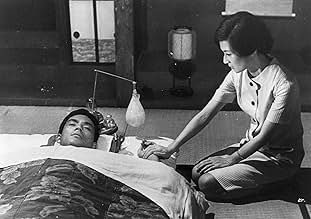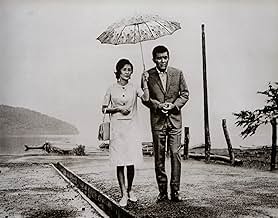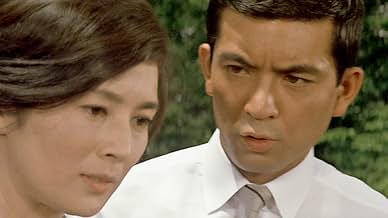AVALIAÇÃO DA IMDb
7,8/10
1,5 mil
SUA AVALIAÇÃO
Adicionar um enredo no seu idiomaA man falls in love with the widow of a man he killed in a car accident. Eventually she falls in love with him in return.A man falls in love with the widow of a man he killed in a car accident. Eventually she falls in love with him in return.A man falls in love with the widow of a man he killed in a car accident. Eventually she falls in love with him in return.
Avaliações em destaque
Despite some recent interest in his works in the west, Mikio Naruse has still largely remained in the shadow of his contemporary Yasujiro Ozu, a comparison that has hasn't served Naruse well. Despite some superficial genre similarities however, a wider look at Naruse's work - few of the director's 89 films have been seen outside Japan - shows that the comparison really isn't even merited. Shot in Tohoscope and in colour, Naruse's gorgeous melodrama Scattered Clouds is closer to Douglas Sirk than Ozu, but it's also possible to consider the film's style and subject matter as being influential on other Asian filmmakers like Wong Kar-Wai (In the Mood For Love) and the Korean master of romantic melodrama Hur Jin-Ho (April Snow). The pace is more sedate, but considering the nature of the encounter here, the passions are necessarily of the slow-burn kind.
It takes that long for Yumiko's feelings to change towards the man who was responsible for her husband's death in a car accident. Shiro, a driver for an escort/entertainments company, has been cleared of any wrongdoing, but can't help but feel a sense of guilt for what has happened, particularly when Yumiko is subsequently disinherited from her husband's family protection. It's this sense of guilt on both sides, for different reasons that draws the couple together, and at the same time proves to be an impossible impediment to the love that they eventually feel for each other.
Strikingly shot, delicately understated, with the occasional abstract poetic cutaway to sustain mood and tension, the pacing and balancing of emotions is masterful as the film builds towards a quietly devastating conclusion.
It takes that long for Yumiko's feelings to change towards the man who was responsible for her husband's death in a car accident. Shiro, a driver for an escort/entertainments company, has been cleared of any wrongdoing, but can't help but feel a sense of guilt for what has happened, particularly when Yumiko is subsequently disinherited from her husband's family protection. It's this sense of guilt on both sides, for different reasons that draws the couple together, and at the same time proves to be an impossible impediment to the love that they eventually feel for each other.
Strikingly shot, delicately understated, with the occasional abstract poetic cutaway to sustain mood and tension, the pacing and balancing of emotions is masterful as the film builds towards a quietly devastating conclusion.
Naruse's final four films paint an interesting picture of this artist at the end of his career. "Midareru" (Yearning, 1964) was a work, where he crafted his signature style to perfection for the final time. "Onna no naka ni iru tanin" (The Stranger Within a Woman, 1966) and "Hikinige" (Moment of Terror, 1966) where something different; the director's experiments or even forays into suspense and crime narratives. The latter featured a narrative centered around a case of hit and run, supported by a critique of today's cold mentality and heavy traffic. These are interesting films to keep in mind while assessing Naruse's final work "Midaregumo" (Two in the Shadow, 1967), which starts off from a traffic accident and then moves on to become a loose reworking of "Yearning".
Many reviewers have pointed out, how this, among all Naruse films, most resembles the style of Douglas Sirk. I agree. After a series of films in black and white, Naruse got to once more make a film in fresh, summery colors, and to use this tranquil beauty as the backdrop for a narrative about pain, love, and communal expectations. In a way, it's not that far from Sirk's "All That Heaven Allows" (1955), though you could just as well name "The Magnificent Obsession" (1956) as the closest thematic counterpart. And to keep on with the comparisons, the lead-couple of beautiful people whose acting is so-so kind of brings to mind the likes of Lana Turner and John Gavin.
Mishima (Kayama Yuzo) is a company worker, who kills the husband of Yumiko (Tsukasa Yoko) in a car accident. He is guilt-ridden, even though the court does not find him guilty of anything. The company sees him as bad publicity, and transfers him to an office in a remote part of the country. As destiny would have it, this is also where Yumiko travels to take her mind off the pain. The couple bump into each other, and gradually out of guilt and hate, warmer feelings start to form.
The score is far from minimal, and helps to establish the larger-than-life feelings of the story. It also helps Naruse to keep other elements more subtle, and the film goes on in a pace that's very careful. The film is very reserved on the outside, and you get the sense that it hides the biggest angst deep down. Yumiko does not know how she should act when the man who killed her husband suddenly becomes a part of her life. Even though the cast of characters is small, one always has to be nervous about how other people view your actions.
I don't know if Naruse knew this was going to be the final one for him, but he manages to assemble together most of the key players of his final decade of film-making. Kayama played practically the same role in "Yearning", while Tsukasa played the hit-and-run driver in "Moment of Terror". Those can't be coincidences. Other familiar faces from Naruse's earlier films include Kato Daisuke, Hama Mie, Nakamura Nobuo, and Urabe Kumeko. It's a shame that Takamine Hideko is absent, but then again after 20-something collaborations with Naruse, we can't really fault them for taking breaks once in a while, too.
In the end, "Midaregumo" is not one of the director's best works, but still a more confident closing chapter for his filmography than what his two previous films would have been. The film is a bit loose, and a bit too slow, and possibly Naruse has difficulty to make the beautiful summery landscapes work for the benefit of the narrative's internal darkness. Still, it's an interesting look at how the force of destiny tampers in the lives of individuals, and a functional companion piece for "Yearning", his last masterwork.
Many reviewers have pointed out, how this, among all Naruse films, most resembles the style of Douglas Sirk. I agree. After a series of films in black and white, Naruse got to once more make a film in fresh, summery colors, and to use this tranquil beauty as the backdrop for a narrative about pain, love, and communal expectations. In a way, it's not that far from Sirk's "All That Heaven Allows" (1955), though you could just as well name "The Magnificent Obsession" (1956) as the closest thematic counterpart. And to keep on with the comparisons, the lead-couple of beautiful people whose acting is so-so kind of brings to mind the likes of Lana Turner and John Gavin.
Mishima (Kayama Yuzo) is a company worker, who kills the husband of Yumiko (Tsukasa Yoko) in a car accident. He is guilt-ridden, even though the court does not find him guilty of anything. The company sees him as bad publicity, and transfers him to an office in a remote part of the country. As destiny would have it, this is also where Yumiko travels to take her mind off the pain. The couple bump into each other, and gradually out of guilt and hate, warmer feelings start to form.
The score is far from minimal, and helps to establish the larger-than-life feelings of the story. It also helps Naruse to keep other elements more subtle, and the film goes on in a pace that's very careful. The film is very reserved on the outside, and you get the sense that it hides the biggest angst deep down. Yumiko does not know how she should act when the man who killed her husband suddenly becomes a part of her life. Even though the cast of characters is small, one always has to be nervous about how other people view your actions.
I don't know if Naruse knew this was going to be the final one for him, but he manages to assemble together most of the key players of his final decade of film-making. Kayama played practically the same role in "Yearning", while Tsukasa played the hit-and-run driver in "Moment of Terror". Those can't be coincidences. Other familiar faces from Naruse's earlier films include Kato Daisuke, Hama Mie, Nakamura Nobuo, and Urabe Kumeko. It's a shame that Takamine Hideko is absent, but then again after 20-something collaborations with Naruse, we can't really fault them for taking breaks once in a while, too.
In the end, "Midaregumo" is not one of the director's best works, but still a more confident closing chapter for his filmography than what his two previous films would have been. The film is a bit loose, and a bit too slow, and possibly Naruse has difficulty to make the beautiful summery landscapes work for the benefit of the narrative's internal darkness. Still, it's an interesting look at how the force of destiny tampers in the lives of individuals, and a functional companion piece for "Yearning", his last masterwork.
Yûzô Kayama loses control of his car when a tire blows and kills Yôko Tsukasa's husband. Although a court finds him not guilty, he insists on paying her 15,000 yen a month; his company transfers him to a rural branch.
Meanwhile, Miss Tsukasa is angry about her husband's death, angry that his family wants to remove her name from the family register so they can collect his death benefits, humiliated that she must accept this blood money. When her brother's widow invites her to move back to the family inn, she accepts, and refuses any further from Mr. Kayama. Her sister-in-law's married lover wants her to become the mistress of a business associate to further his prosperity; and the branch of the company that Mr. Kayama has been transferred to uses that very inn to entertain clients.
Mikio Naruse's last movie is about the plight of a woman in modern Japan, trapped between her own desires and emotions and public expectations. It differs from the stereotyped idea of his movies in that Kayama is not a villain, not even unthinkingly so. He is as trapped by the terrible accident as she is, caught by his own sense of right and wrong. He wants to do right by this woman he has wronged. He wants to get out of the small hick town. He wants.... well, he wants what he cannot have.
Naruse and his crew indicate the dullness and repression of modern Japanese society by, among other choices, using a repressed color palette. Almost everyone dresses in greys and tans, and the first flash of red isn't seen until almost half an hour has passed.
Meanwhile, Miss Tsukasa is angry about her husband's death, angry that his family wants to remove her name from the family register so they can collect his death benefits, humiliated that she must accept this blood money. When her brother's widow invites her to move back to the family inn, she accepts, and refuses any further from Mr. Kayama. Her sister-in-law's married lover wants her to become the mistress of a business associate to further his prosperity; and the branch of the company that Mr. Kayama has been transferred to uses that very inn to entertain clients.
Mikio Naruse's last movie is about the plight of a woman in modern Japan, trapped between her own desires and emotions and public expectations. It differs from the stereotyped idea of his movies in that Kayama is not a villain, not even unthinkingly so. He is as trapped by the terrible accident as she is, caught by his own sense of right and wrong. He wants to do right by this woman he has wronged. He wants to get out of the small hick town. He wants.... well, he wants what he cannot have.
Naruse and his crew indicate the dullness and repression of modern Japanese society by, among other choices, using a repressed color palette. Almost everyone dresses in greys and tans, and the first flash of red isn't seen until almost half an hour has passed.
Regardless of Naruse's whole career and movies (which are great), this last one is remarkable in many ways. But above all, what best defines the movie is what it is not: loud, flamboyant, predictable. Given the same script who would have made such a movie? Even Douglas Sirk, the king of melodrama would not have resisted the temptation of something more dramatic and controversial .
Naruse's movie has what 99% of all movies lack: discretion, delicacy, respect.
Yet it is a passionate movie if you can imagine and feel what the characters experience, what is boiling under the surface of the polished Japanese volcano.We too want to yell and free the caharacters from all the weight and pressure of a rigid society.
Experience something different: no sex, no killing, no bloodshed, nothing low. Feelings and inner turmoil, at the highest degree, near incandescence.
A great movie!
Você sabia?
- CuriosidadesThis film inspired the movie Cold Bloom.
Principais escolhas
Faça login para avaliar e ver a lista de recomendações personalizadas
- How long is Scattered Clouds?Fornecido pela Alexa
Detalhes
- Tempo de duração1 hora 48 minutos
- Mixagem de som
- Proporção
- 2.35 : 1
Contribua para esta página
Sugerir uma alteração ou adicionar conteúdo ausente

Principal brecha
By what name was Nuvens Dispersas (1967) officially released in India in English?
Responda



























